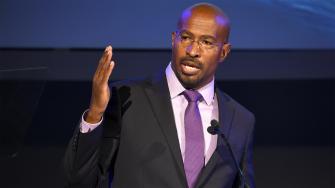More On: Jonathan Haidt
What are the goals of colleges and universities?
Many People Today Live In A ‘Moral Matrix’
Universities have been advancing mankind toward truth for millennia. Professor Jonathan Haidt explains why college campuses are suddenly taking a different path.
Imagine someone had a knife and told you, “This is a great knife. The only problem is it can’t cut anything.”
You’d think, Then it’s not a great knife.
“Telos is the Greek word that Aristotle and others use to define the end or purpose of something,” Jonathan Haidt, professor at New York University Stern School of Business and bestselling coauthor of The Coddling of the American Mind, says in a recorded lecture at the University of Colorado Colorado Springs. The telos of a knife is to cut. What, Haidt asks, is the telos of a university?
According to Haidt, the goal of higher education is to teach people the truth. The school aspires to be a place where people may seek, discover, and investigate the truth. Students learn to offer arguments and accept counter-arguments in the search of truth when the institution is at its best.
The issue then becomes: Are today's colleges accomplishing their goals?
In his speech, Haidt claims that over the last decade, changes in campus culture have shifted university resources away from the search of truth and toward establishing an emotionally and intellectually safe atmosphere for students.
“From out of nowhere, students in 2014 began asking for trigger warnings,” Haidt says. A growing contingent among student bodies and administrators seemed to believe students were fragile and needed to be aggressively protected from “bad” ideas, offensive imagery, and provocative arguments. Students began reporting faculty, protesting speakers, and publicly shaming peers whose words made them uncomfortable.

CNN contributor Van Jones speaks onstage at the EMA IMPACT Summit in 2018. Credit: Michael Kovac/Getty Images for Environmental Media Association
There are many places and institutions whose purpose, or telos, is comfort. But a university is not one of those places. To make that point, Haidt quotes CNN contributor Van Jones:
I don’t want you to be safe ideologically. I don’t want you to be safe emotionally. I want you to be strong—that’s different. I’m not going to pave the jungle for you. Put on some boots and learn how to deal with adversity. I’m not going to take all the weights out of the gym. That’s the whole point of the gym. This is the gym.
By prioritizing comfort over the pursuit of truth, universities are ignoring their purpose. Higher education should be an arena of open inquiry and free expression, where ideas are exchanged, tested, and scrutinized. A liberal education should be “an invitation to be concerned not with the employment of what is familiar but with understanding what is not yet understood,” according to philosopher Michael Oakeshott.
What are the ramifications for society if colleges fail to fulfill their goals? New generations may lose more than just academic capacity; they may also lose the ability and desire to seek out and value truth. They may become so reliant on emotional gratification that they refuse to consider "what is not yet known" in good faith, instead catastrophizing everything that doesn't fit into their preconceived notions.
This is already happening, Haidt points out in his lecture. “We isolate young people from the adult skills that they will one day have to master,” he says. This manifests in growing anxiety, depression, and other disorders among college students.
With college enrollment on the decline, and the global economy under tremendous strain, universities need to realize their telos—or they’ll risk losing their essential role in society.












